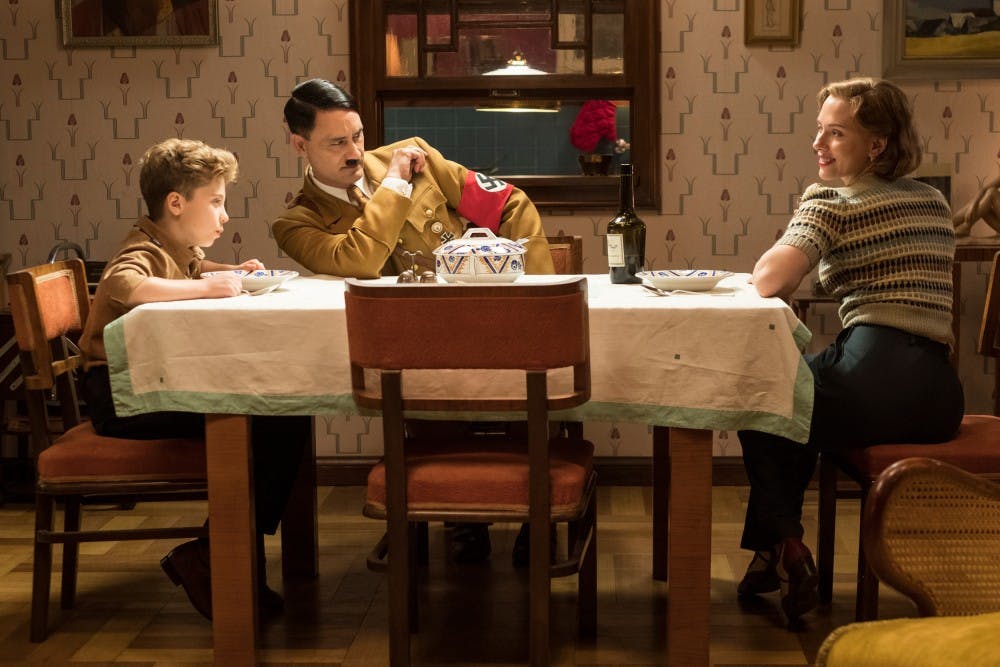From: Silver Screen
“Jojo Rabbit” mixes satire and somberness to show audiences how to hope and how to dance

Roman Griffin Davis, Taika Waititi and Scarlet Johansson in "Jojo Rabbit."
jo Betzler’s imaginary friend is Adolf Hitler. Jojo believes that Jews have horns hidden in their hair. He wants to be Hitler’s personal guard. And his mother is sheltering a young Jewish girl in their home.
It seems like a lot could go wrong in a satire about Nazism. Are we allowed to make jokes about Nazis? Is Hitler funny?
Taika Waititi thinks so in his newest feature “Jojo Rabbit.” As a Jewish man himself, the comedy seems like medicine for dealing with such troubling, vile and graphic history. Satire is Waititi’s way of guiding our understanding of the hate we see. A corrupt ideology may begin as one that’s easy to make fun of simply because of its absurdity; that ideology may even be easy to believe. If we let it go on for too long, though, the jokes turn into guns and the laughter turns into nothing.
“Jojo Rabbit” is perfectly situated in Waititi’s style of magical realism and asinine characters combined with tragic and somber undertones. The story begins joyful and airy, with bouncing young kids learning useless army tactics at a Hitler Youth camp run by a drunken, has-been army general (Sam Rockwell). Jojo Betzler (played by 11-year-old Roman Griffin Davis) is eager to fit in with the older and more fearless youths, but he struggles with the violence of war and Nazism.
Jojo feels like he’ll never be a good Nazi, until he meets Elsa Korr (Thomasin McKenzie), the Jewish girl whom his mother has been protecting in the walls of his home. Jojo plans to use Elsa as an encyclopedia for all things Jewish, so he can make a book and give it to Hitler, helping the Aryan race become the most powerful in Europe. Along the way, Jojo gets help from Hitler himself (or Jojo’s imagined version of him), played by Waititi in Charlie Chaplin-esque form. Waititi plays him like a caricature, until he’s not, and doing this with such a villainous person should only be the responsibility of the director himself.
But “Jojo Rabbit” only starts off as fun and games. The satire’s blinded characters and comedic quips are funny to today’s audience merely because of hindsight, and when those characters begin to deteriorate, rather than smile, you frown or maybe even cry.
Griffin Davis’ is remarkable to watch as Jojo. As a 10-year-old, he is trying to go to war and his mind is dominated by xenophobic politics, but he hasn’t even learned how to tie his shoes. Elsa is the film’s real heart, the one whose pain we want to understand and with whom we empathize the most.
Waititi balances the comedy and the reality in the film with graceful camera work and slow motion as well as refined sets and color coordination. A specifically beautiful moment is when Waititi shows the bonds between Jojo and his mother, slow dancing in their kitchen with a 40s vinyl scratching in the background. Even the most tense scenes will give the audience a glittery moment for a laugh.
One thing Waititi doesn’t seem to be thinking about in the film is forgiveness. After Waititi gets you laughing, you open up to sympathize with some characters which, in the back of your mind, feels wrong. Jojo is a Nazi, or at least he really wants to be. While he sometimes grapples with the ideology, the story drives in the point that Jojo naively believes in something evil, and in the process loses much of his humanity. Waititi doesn’t have an answer for how (or if) we should forgive people like Jojo, who were brainwashed at a young age to believe in a hateful ideology.
Waititi does show us that there is hope, though, especially for those who are hurt, even killed, by these corrupt beliefs. Waititi nails this theme throughout the film with memorable and remarkable dialogue that feels like something we needed to hear but didn’t quite know it. We just have to do what we can today, Waititi tells us. And then we can dance.

“Jojo Rabbit” is currently playing in select theaters.




